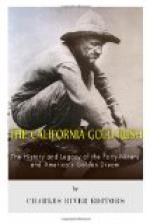With the proper officials in charge of the executive end of the government and with a trained crew of lawyers making their own rules as they went along, almost any crime of violence, corruption, theft, or the higher grades of finance could be committed with absolute impunity. The state of the public mind became for a while apathetic. After numberless attempts to obtain justice, the public fell back with a shrug of the shoulders. The men of better feeling found themselves helpless. As each man’s safety and ability to resent insult depended on his trigger finger, the newspapers of that time made interesting but scurrilous and scandalous reading. An appetite for personalities developed, and these derogatory remarks ordinarily led to personal encounters. The streets became battle-grounds of bowie-knives and revolvers, as rivals hunted each other out. This picture may seem lurid and exaggerated, but the cold statistics of the time supply all the details.
The politicians of the day were essentially fighting men. The large majority were low-grade Southerners who had left their section, urged by unmistakable hints from their fellow-citizens. The political life of early California was colored very largely by the pseudo-chivalry which these people used as a cloak. They used the Southern code for their purposes very thoroughly, and bullied their way through society in a swashbuckling manner that could not but arouse admiration. There were many excellent Southerners in California in those days, but from the very start their influence was overshadowed by the more unworthy. Unfortunately, later many of the better class of Southerners, yielding to prejudice and sectional feeling, joined the so-called “Law and Order” party.
It must be remembered, however, that whereas the active merchants and industrious citizens were too busy to attend to local politics, the professional low-class Southern politician had come out to California for no other purpose. To be successful, he had to be a fighting man. His revolver and his bowie-knife were part of his essential equipment. He used the word “honor” as a weapon of defense, and battered down opposition in the most high-mannered fashion by the simple expedient of claiming that he had been insulted. The fire-eater was numerous in those days. He dressed well, had good manners and appearance, possessed abundant leisure, and looked down scornfully on those citizens who were busy building the city, “low Yankee shopkeepers” being his favorite epithet.
Examined at close range, in contemporary documents, this individual has about him little of romance and nothing whatever admirable. It would be a great pity, were mistaken sentimentality allowed to clothe him in the same bright-hued garments as the cavaliers of England in the time of the Stuarts. It would be an equal pity, were the casual reader to condemn all who eventually aligned themselves against the Vigilance movement as of the same stripe as the criminals who menaced society. There were many worthy people whose education thoroughly inclined them towards formal law, and who, therefore, when the actual break came, found themselves supporting law instead of justice.




